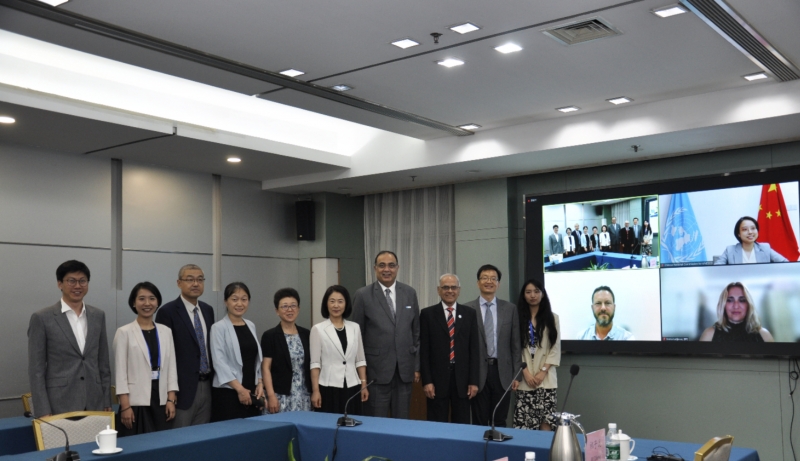On July 31, the second plenary meeting of the second Governing Board of CISTRAT was held in a hybrid format of both in person and online. Vice Minister Lin Xin of the Ministry of Science and Technology of China (MOST) attended the meeting as the chairperson of CISTRAT GB. Representatives from the Department of Basic Sciences of the United Nations Educational, Scientific and Cultural Organization (UNESCO), the Department of International Cooperation of MOST, and Chinese Academy of Science and Technology for Development (CASTED) attended the meeting. The meeting was presided over by Guo Rong, Vice President of CASTED.
Vice Minister Lin Xin first thanked the GB members for their attendance and strong support for CISTRAT. She pointed out that since its establishment in 2012, under the guidance and support of UNESCO and the Chinese National Commission for UNESCO, CISTRAT has carried out a series of fruitful work towards the realization of the 2030 Sustainable Development Goals (SDGs), and has cooperated with international and domestic institutions to carry out academic exchanges, policy research, network building and other activities, and shared China's experience with developing countries. CISTRAT deeply participated in The International Decade of Science for Sustainable Development 2024-2033, which fully embodies UNESCO's purpose to promote scientific and technological cooperation among countries and strive to make scientific and technological contributions to global peace and security.
Liu Dongmei, Secretary-General of CASTED reported to the GB on the progress of work in 2023-2024 and the work plan for 2025 on behalf of CISTRAT. She said that from 2023 to the first half of 2024, CISTRAT has carried out work in five aspects: providing quality education, promoting gender equality, addressing climate change, participating in open science, and establishing global partnerships. CISTRAT has expanded its cooperation network and strengthened training exchanges, joint scientific research and partnership building with developing countries, especially the Belt and Road countries, by organizing training workshops, participating in dialogues with international organizations, expanding and deepening institutional cooperation, and carrying out international cooperation research and academic exchanges. In 2025, CISTRAT will continue to carry out science and technology policy training for developing countries, launch a new round of agreement renewal, carry out academic exchanges and joint research in the field of science and technology policy under the framework of the International Decade of Science for Sustainable Development 2024-2033, and actively carry out exchanges and cooperation with other international and domestic Category 2 Centers and science and technology innovation think tanks.
Shahbaz Khan, Director and Representative to UNESCO Regional Office for East Asia, Ge Siying, Deputy Secretary-General of the Chinese National Commission for UNESCO, Manzoor Hussain Soomro, former President and Advisor of the Economic Cooperation Organization of Pakistan (ECOSF), Adrian Ely, Professor of the Centre for Science and Technology Policy Research (SPRU) at the University of Sussex, Ana Celia Castro, Professor at Rio State University, and Ivona Ladjevac, Deputy Director of the Serbia Institute of International Political Economy (IIPE), as members of the GB, made recommendations on the work of CISTRAT. They expressed the hope that CISTRAT will make greater contributions to promoting research on global issues such as artificial intelligence governance and open science, promoting international scientific and technological cooperation, and achieving the SDGs. The GB adopted a resolution to amend the Charter of CISTRAT, and agreed that Liu Dongmei would take over as the Director of CISTRAT.
In her concluding remarks, Vice Minister Lin Xin expressed her gratitude to the members of the GB for their constructive suggestions. She said that the Chinese government's concept of scientific and technological innovation, sustainable development, and international scientific and technological cooperation are fully in line with UNESCO's mandate of promoting international cooperation, enhancing mutual understanding among peoples, and safeguarding world peace. She put forward expectations for the future development of CISTRAT, and hoped that CISTRAT would better play the role of the GB, strengthen training and research on issues of common concern to the international community, such as climate change and artificial intelligence, take the initiative to initiate and participate in international science and technology issues, continuously expand the international cooperation network, and make more contributions to support sustainable development.


 No.8 Yuyuantan South Road, Haidian District, Beijing, 100038
No.8 Yuyuantan South Road, Haidian District, Beijing, 100038
 +8610 58884695 58884506
+8610 58884695 58884506
 +8610 58884678 58884588
+8610 58884678 58884588
 casted@casted.org.cn
casted@casted.org.cn
 http://www.casted.org.cn
http://www.casted.org.cn
